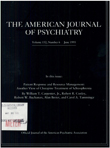Discontinuation of benzodiazepine treatment: efficacy of cognitive- behavioral therapy for patients with panic disorder
Abstract
OBJECTIVE: The primary disadvantage of high-potency benzodiazepine treatment for panic disorder is the difficulty of discontinuing the treatment. During treatment discontinuation, new symptoms may emerge and anxiety may return, preventing many patients from successfully discontinuing their treatment. In this controlled, randomized trial the authors investigated the efficacy of a cognitive-behavioral program for patients with panic disorder who were attempting to discontinue treatment with high-potency benzodiazepines. METHOD: Outpatients treated for panic disorder with alprazolam or clonazepam for a minimum of 6 months and expressing a desire to stop taking the medication (N = 33) were randomly assigned to one of two taper conditions: a slow taper condition alone or a slow taper condition in conjunction with 10 weeks of group cognitive-behavioral therapy. RESULTS: The rate of successful discontinuation of benzodiazepine treatment was significantly higher for the patients receiving the cognitive-behavioral program (13 of 17; 76%) than for the patients receiving the slow taper program alone (four of 16; 25%). There was no difference in the likelihood of discontinuation success between the patients treated with alprazolam and those who received clonazepam. At the 3-month follow-up evaluation, 77% of the patients in the cognitive-behavioral program who successfully discontinued benzodiazepine treatment remained benzodiazepine free. CONCLUSIONS: These findings support the efficacy of cognitive-behavioral interventions in aiding benzodiazepine discontinuation for patients with panic disorder.
Access content
To read the fulltext, please use one of the options below to sign in or purchase access.- Personal login
- Institutional Login
- Sign in via OpenAthens
- Register for access
-
Please login/register if you wish to pair your device and check access availability.
Not a subscriber?
PsychiatryOnline subscription options offer access to the DSM-5 library, books, journals, CME, and patient resources. This all-in-one virtual library provides psychiatrists and mental health professionals with key resources for diagnosis, treatment, research, and professional development.
Need more help? PsychiatryOnline Customer Service may be reached by emailing [email protected] or by calling 800-368-5777 (in the U.S.) or 703-907-7322 (outside the U.S.).



